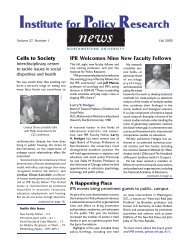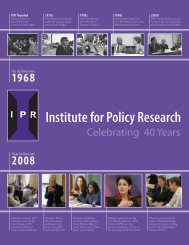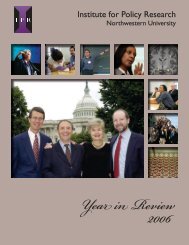Highlights of 2011 - Institute for Policy Research - Northwestern ...
Highlights of 2011 - Institute for Policy Research - Northwestern ...
Highlights of 2011 - Institute for Policy Research - Northwestern ...
You also want an ePaper? Increase the reach of your titles
YUMPU automatically turns print PDFs into web optimized ePapers that Google loves.
Message from the Director<br />
Our Relevance and Expertise<br />
For more than four decades, IPR has stayed its path as a<br />
research institute devoted to policy-relevant research. We<br />
believe that the problems that confront America should not<br />
be viewed through the lens <strong>of</strong> just one discipline but are better<br />
viewed from bridges that cross multiple disciplines. This is why<br />
we promote an interdisciplinary approach to research, and<br />
why we take particular care to support projects such as the<br />
MacArthur Network on How Housing Matters <strong>for</strong> Children<br />
and Families, chaired by social psychologist Thomas D. Cook,<br />
that brings together economists, psychologists, sociologists, and<br />
developmental specialists (see p. 19).<br />
As researchers, we also take up topics that serve to in<strong>for</strong>m<br />
current policy debates. These include research on energy<br />
policy, food stamps, segregation and poverty concentration,<br />
school vouchers and higher education, biological effects <strong>of</strong><br />
stress, and psychological manifestations <strong>of</strong> race, to name a few<br />
(see pp. 12–57).<br />
We believe that our interdisciplinary approach coupled with our<br />
reputation <strong>for</strong> conducting high-quality, methodologically strong<br />
research has led to a long-standing and solid track record <strong>of</strong><br />
support—in an incredibly competitive funding environment—<br />
from state and federal governments and some <strong>of</strong> our nation’s<br />
most esteemed foundations. In all, 60 IPR research projects<br />
were supported by funders in <strong>2011</strong> (see pp. 78–79).<br />
Perhaps most important, we feel that our expertise is meant to<br />
be shared. We ran four faculty-led training workshops in <strong>2011</strong>,<br />
three on methodology <strong>for</strong> education experiments and another<br />
on how to use biomarkers in field research (see pp. 20, 49). We<br />
also <strong>of</strong>fer graduate research assistantships that allow some <strong>of</strong> our<br />
most promising graduate students to work with IPR faculty on a<br />
wide variety <strong>of</strong> research projects. In addition, we organized the<br />
14th year <strong>of</strong> our Summer Undergraduate <strong>Research</strong> Assistants<br />
Program <strong>for</strong> 23 students, which introduced them to the inner<br />
workings <strong>of</strong> social science research (see pp. 76–77).<br />
Our Dissemination<br />
No public policy institute, however, can make its mark without<br />
connecting with the policymaking community and the public.<br />
This is why the <strong>Institute</strong> spends a considerable amount <strong>of</strong> ef<strong>for</strong>t<br />
in disseminating its faculty’s findings through its website, publications,<br />
social media, working papers, and <strong>of</strong> course, events such<br />
as conferences, policy research briefings, panels, and colloquia.<br />
Over <strong>2011</strong>, we held 54 colloquia and events, approximately onefourth<br />
<strong>of</strong> which were co-sponsored with other departments and<br />
schools within <strong>Northwestern</strong>. Two <strong>of</strong> our biggest events <strong>of</strong> the<br />
year were attended not only by academics, but also by students<br />
and the wider public. Our policy research briefing brought<br />
together more than 120 academics, students, policymakers, and<br />
others to examine how environments affect the lifecourse from<br />
the earliest developmental stages to adult achievement and<br />
cross-national mortality with IPR developmental psychologist<br />
Lauren Wakschlag, IPR economist Jonathan Guryan, and MIT<br />
economist Michael Greenstone. IPR’s <strong>2011</strong> Distinguished Public<br />
<strong>Policy</strong> Lecture with then-U.S. Census Bureau Director Robert<br />
Groves gave more than 100 participants the opportunity to<br />
hear him address the differences in dealing with statistics as an<br />
academic and as the nation’s chief statistician.<br />
Our Future<br />
In August 2012, I am stepping down as director after 16 years<br />
<strong>of</strong> leading IPR, to continue on with my teaching and research<br />
as an IPR fellow. My mantra while I have been at IPR has always<br />
been “onward and upward.” While leading such an exciting and<br />
demanding research enterprise, in particular one that crosses<br />
multiple disciplines, is never an easy task, I have treasured my<br />
time as IPR’s director. Nonetheless, I could not be happier<br />
to leave IPR in the extremely capable hands <strong>of</strong> my brilliant<br />
friend and colleague, education economist David Figlio. I have<br />
no doubt that he will surpass me in every way in leading IPR<br />
“onward and upward.”<br />
IPR MISSION AND SNAPSHOT<br />
“The mission <strong>of</strong> the <strong>Institute</strong> <strong>for</strong> <strong>Policy</strong><br />
<strong>Research</strong> is to stimulate and support<br />
excellent social science research<br />
on significant public policy issues and<br />
to disseminate the findings widely—to<br />
students, scholars, policymakers,<br />
and the public.”<br />
• 38 Faculty Fellows<br />
• 74 Faculty Associates<br />
• 8 Postdoctoral Fellows<br />
• 34 Graduate <strong>Research</strong> Assistants<br />
• 25 Undergraduate <strong>Research</strong> Assistants<br />
• 60 Active Grants in <strong>2011</strong><br />
3

















